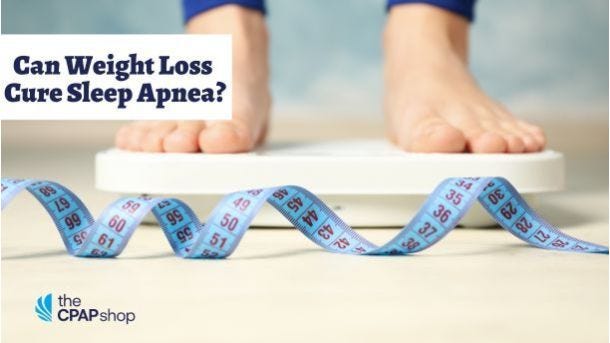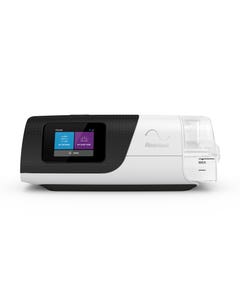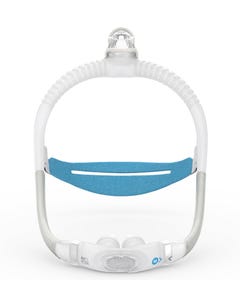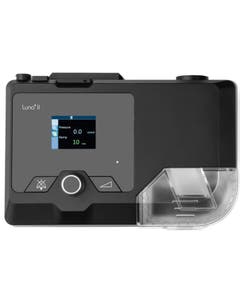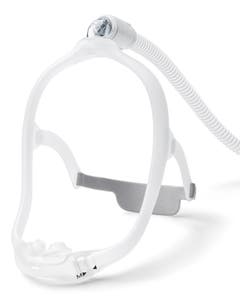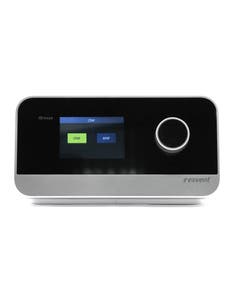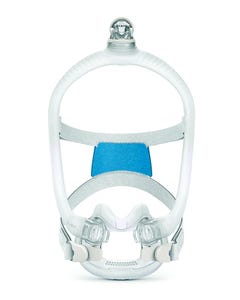Can Weight Loss Cure Sleep Apnea?
Is weight loss is the best way to lessen – or even cure – people's sleep apnea?
Patients have heard from their doctors that a relationship exists between weight and the severity of sleep apnea. It is said that being overweight or obese can cause or make sleep apnea worse. Patients also seem to think that simply losing weight can improve sleep apnea and its symptoms. Unfortunately, many have fallen prey to the misconception; lose weight in order to eliminate sleep apnea. Unfortunately, it’s not that simple.
Your body needs a certain balance between sleep, diet, and exercise in order to lose weight. If any of these variables is unbalanced, it will be harder to lose weight. For example, if you're not getting enough sleep due to sleep apnea, your efforts of losing weight may not work.
This is because a lack of sleep doesn’t just make you tired. According to Phyllis C. Zee, a neurologist and the director of the sleep disorders center at Northwestern University Feinberg School of Medicine in Chicago, sleep deprivation negatively alters the energy balances and functions of all your body’s tissues. Specifically, it disrupts the hormones your body releases to control hunger. Levels of the satiety hormone, leptin, decrease, and levels of the hunger hormone, ghrelin, increase. Binge eating on bad fats and carbs, sugar, and salt becomes a biological certainty.
In fact, a study conducted by the Mayo Clinic found that adults who slept 80 minutes less than their norm increased their calorie intake by about 549 calories. If you think about what kinds of foods you typically overeat, you can be sure that these calories were not from healthy foods.
So, if your sleep apnea prevents you from getting enough sleep, it will be difficult eat healthy. It will also be hard to have enough energy to exercise. Something has to break the cycle. This something could possibly be CPAP therapy.
During a sleep apnea event, your body stops breathing. This then causes a sleep disturbance and basically wakes you from sleep periodically throughout the night. You’re probably not aware of these events as they’re happening, but you’re feeling the effect of them when you’re tired or lack focus all day. CPAP therapy applies positive pressure to the airway, allowing the body to get enough oxygen, which stops the sleep disturbances.
Once you’re able to get enough sleep (somewhere between 7 to 9 hours for adults 18 to 64 according to the National Sleep Foundation), your hunger hormone levels will stabilize enabling you to better adhere to a healthier diet, and increased energy levels will enable you to perform more productive workouts.
Circling back to our original question, weight loss is certainly helpful for improving sleep apnea, but it would be very difficult to actually lose weight getting enough sleep. Furthermore, losing weight does not necessarily mean that your sleep apnea will go away. As always, check with your doctor to come up with a multi-pronged approach to get your body and mind back on track.
Key Takeaways
- Sleep loss can cause a hormonal imbalance that affects appetite.
- Poor sleep can lead to more hunger cravings, which can lead to overeating and weight gain.
- Healthy sleep keeps appetite hormones in balance, so weight loss efforts become easier.
What is Sleep Apnea?
Sleep apnea is a sleep disorder that occurs when a person repeatedly starts and stops breathing while asleep at night. While you may not even know you have sleep apnea, this condition is a serious matter that should be addressed by your healthcare provider. Common symptoms of sleep apea include loud snoring, daytime sleepiness, waking up gasping for air, and more. Two of the major risk factors for sleep apnea are age and weight.
Sleep and Body Metabolism
While the body’s metabolism actually slows down during sleep, sleep deprivation can affect metabolism different ways during your waking life. Without proper sleep, your brain experiences chemical changes that can affect metabolism. Sleep deprivation can trigger a dramatic cortisol spike while you are awake. Cortisol is a stress hormone that manages energy and tells the brain when it needs more calories to function. When this hormone is unbalanced, you may experience hunger cravings, often for high-calorie foods. The result is that you may overeat the wrong kind of foods, which affects your metabolism during waking hours, because of lost sleep at night.
Sleep and Weight Loss
Patients have heard from their doctors that a relationship exists between weight and the severity of sleep apnea. It is said that being overweight or obese can cause or make sleep apnea worse. Patients also seem to think that simply losing weight can improve sleep apnea and its symptoms. Unfortunately, many have fallen prey to the misconception; lose weight in order to eliminate sleep apnea. Unfortunately, it’s not that simple.
Your body needs a certain balance between sleep, diet, and exercise in order to lose weight. If any of these variables is unbalanced, it will be harder to lose weight. For example, if you're not getting enough sleep due to sleep apnea, your efforts to lose weight may not work.
This is because a lack of sleep doesn’t just make you tired. According to Phyllis C. Zee, a neurologist and the director of the sleep disorders center at Northwestern University Feinberg School of Medicine in Chicago, sleep deprivation negatively alters the energy balances and functions of all your body’s tissues. Specifically, it disrupts the hormones your body releases to control hunger. Levels of the satiety hormone, leptin, decrease, and levels of the hunger hormone, ghrelin, increase. Binge eating on bad fats and carbs, sugar, and salt becomes a biological certainty.
In fact, a study conducted by the Mayo Clinic found that adults who slept 80 minutes less than their norm increased their calorie intake by about 549 calories. If you think about what kinds of foods you typically overeat, you can be sure that these calories are not from healthy foods. So, if your sleep apnea prevents you from getting enough sleep, it won't be easy to eat healthy. It will also be hard to have enough energy to exercise. Something has to break the cycle. This could possibly be CPAP therapy.
Can Sleep Apnea be Cured by Losing Weight?
During a sleep apnea event, your body stops breathing. This then causes a sleep disturbance and basically wakes you from sleep periodically throughout the night. You’re probably not aware of these events as they’re happening, but you’re feeling the effect of them when you’re tired or lack focus all day. CPAP therapy applies positive pressure to the airway, allowing the body to get enough oxygen, which stops sleep disturbances.
Once you’re able to get enough sleep (somewhere between 7 to 9 hours for adults 18 to 64 according to the National Sleep Foundation), your hunger hormone levels will stabilize enabling you to better adhere to a healthier diet, and increased energy levels will enable you to perform more productive workouts.
Circling back to our original question, weight loss is certainly helpful for improving sleep apnea, but it would be very difficult to actually lose weight by getting enough sleep. Furthermore, losing weight does not necessarily mean that your sleep apnea will go away. As always, check with your doctor to come up with a multi-pronged approach to get your body and mind back on track.
Other Treatment for Sleep Apnea
Continuous Positive Airway Pressure (CPAP)
CPAP therapy helps those with sleep apnea by delivering pressurized air to a person while they are asleep at night, intended to keep your airways open, allowing you to sleep properly and lessen or avoid apnea episodes each night. CPAP machines treat sleep apnea by delivering a stream of oxygenated air into your airways through a mask and a tube. Not only can CPAP therapy help with sleep apnea, but it also improves heart health, improves attitude, reduces stroke risk, and more.
Oral Appliances
Oral appliances are geared towards aiding those who have mild to moderate sleep apnea and prevent the tongue from blocking the throat. An oral appliance is worn on a daily basis to help prevent apneas without a CPAP machine.
There are two types of oral appliances:
- Mandibular Advancement Devices (MADs) open the airway by moving the mandible (the lower jaw) forward.
- Tongue Retaining Devices (TRDs) also work by holding the tongue in a forward position. These devices pull the tongue forward, but instead of moving the jaw forward like a Mandibular Advancement Device (MAD), TRDs directly control the tongue itself.
Surgical Procedures
Surgery is mostly recommended and/or required for the most severe cases of sleep apnea. It is an option a CPAP patient can take if other non-invasive treatments have not worked. Surgeons can choose from a few different methods for treating this condition. Surgical options include:
- Shrinking tissues in the back of the throat to help keep the airway open
- Removing excess tissue in the airway that may be causing the apneas
- Repositioning the jaw to maintain alignment in the airway or tighten the tendons in the tongue
Tips and Tricks for Better Sleep to Lose Weight
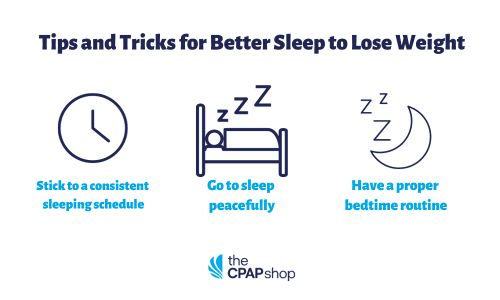
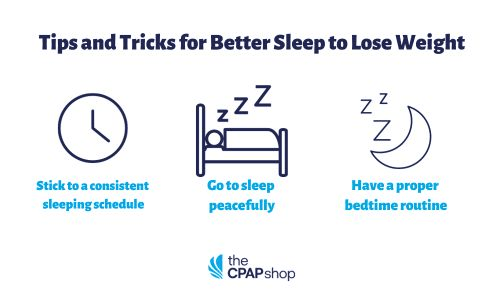
If you are struggling with sleep and trying to lose weight, here are some helpful tips to make good sleep part of your diet plan.
- Keep consistent sleep schedules. Erratic sleep schedules affect hormones in the brain and can lead to midnight binges. Go to bed and wake up at the same time to help your body and mind stay in balance.
- Go to sleep, peacefully. Emotions, stress, and racing thoughts can keep you up and ruin a good night’s sleep. Meditate, exercise, and practice yoga. Do whatever it takes to put your mind in a peaceful place before bedtime.
- Follow bedtime rituals. Consistency is key. Just like your sleep schedule, what you do before bedtime should also be a healthy pattern. Avoid alcohol, eating, and even watching too much TV before going to bed. The body and brain like consistently healthy patterns of behavior. Create a period of downtime for yourself that lets your brain know it’s time for bed. Your body will thank you for it.
For more information or if you would like assistance choosing the best CPAP products for you, our team would be happy to help! Give our knowledgeable staff a call at 866-414-9700 today!



